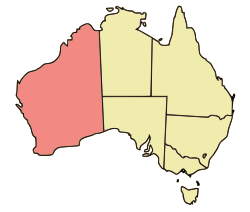Western Australia Police
| Western Australia Police | |
|---|---|

Flag of the Western Australia Police
|
|
| Agency overview | |
| Formed | 1 January 1834 |
| Employees | Approximately 8,750 |
| Legal personality | Governmental: Government agency |
| Jurisdictional structure | |
| Operations jurisdiction* | State of Western Australia, Australia |
 |
|
| Map of Western Australia Police's jurisdiction. | |
| Size | 2,645,615 km2 |
| Governing body | Government of Western Australia |
| General nature | |
| Operational structure | |
| Headquarters | 2 Adelaide Terrace, East Perth, WA 6004 31°57′41″S 115°52′43″E / 31.9613°S 115.8787°ECoordinates: 31°57′41″S 115°52′43″E / 31.9613°S 115.8787°E |
| Agency executive | Karl O'Callaghan PhD, APM, Commissioner |
| Units |
List
|
| Facilities | |
| Stations | 157 |
| Website | |
| www.police.wa.gov.au | |
| Footnotes | |
| * Divisional agency: Division of the country, over which the agency has usual operational jurisdiction. | |
The Western Australia Police provides police services throughout the state of Western Australia, an area of 2.5 million square kilometres, the world's largest non-federated area of jurisdiction, with a population of only 2.4 million, of which 1.9 million reside in the Perth Metropolitan Region.
The genesis of the police was the appointment of a sheriff by Captain Stirling on 18 June 1829, as part of the proclamation of the Swan River Colony. The proclamation provided for the appointment of a sheriff having under his direction a high constable, constables, bailiffs and surveyors of highways. The sheriff still exists as an officer of the Western Australian Justice Department—no longer having jurisdiction over police or highways. The sheriff retains responsibility for enforcement of court judgments and the administration of jury service. Police continue to carry out sheriff and bailiff duties, particularly in remote country locations.
Early colonial policemen were recruited by magistrates and worked part-time. They were paid only for specific tasks, such as one shilling for serving a summons. By 1830, there were fifteen part-time constables in the state, of whom five worked in Perth.
A mounted force was established in 1834, proving unpopular with citizens on the grounds that it was not efficient and was being paid out of their taxes for duties which the military should be performing. It was involved in the "Pinjarra Massacre", in which Captain Ellis, the police superintendent, was killed together with a large number of Aboriginal people. The first full-time constable for Perth was appointed in 1840.
The Legislative Council passed a police ordinance in 1849 that outlined police powers and responsibilities. An organised police force was formally established in 1853.
...
Wikipedia
